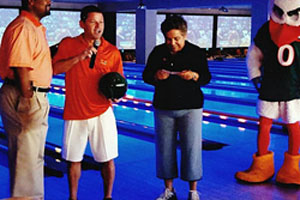The news coming out of Miami in the last couple of days has been
mind-blowing. The scope of what Nevin Shapiro and the Hurricane players, coaches
and administrators did for nearly a decade is unprecedented, as is the mountain
of financial records, photographs, and eyewitness reports documenting
everything. I find myself thinking that the Miami program is rotten to the core,
always has been, and always will be.
If you haven’t read Charles Robinson’s lengthy and fascinating article on
Yahoo! Sports about what went down at Miami, you can find it here:
Renegade Miami football booster spells out illicit benefits to players
Yahoo! Sports, 8/16/2011
While many have chosen to make fun of the situation, those of you who have
been visiting this site for a while know that I take my college athletics very
seriously. Too seriously, I admit. Most who know me personally will tell you I
have a good sense of humor, and I like to laugh, but when it comes to anything
affecting Hokie sports, I’m as serious as an ironman triathlon. It’s a
personality flaw.
The situation in Miami affects the Hokies. How much remains to be seen. One
of the questions surrounding the scandal is whether the Canes will receive the
NCAA’s death penalty, a temporary cessation of a program that is an egregious
violator of NCAA rules.
You know the drill about the death penalty: The NCAA gave it to SMU in the
80s, it was a blow from which SMU never recovered, the NCAA regrets it and
probably won’t ever do it again, yada-yada-yada.
Miami’s testing that resolve, with Shapiro’s tale of cash payouts, lavish
gifts, strippers, expensive dinners, and prostitutes. Coaches were involved.
Administrators turned a blind eye. (Particularly ironic is former chairman of
the NCAA’s committee on infractions Paul Dee’s sanctimonious statements when
handing down the Reggie Bush punishment, that “high-profile players demand
high-profile compliance.” Dee was the AD at Miami while Shapiro was running
rampant.)
If ever the NCAA was going to hand out the death penalty, it’s now, in this
instance.
The problem with handing out the death penalty is that it quit being a
school-specific punishment decades ago, right around the time SMU got blasted
with it. With today’s fat TV contracts and bowl tie-ins, which are inked at the
conference level, punishing one school punishes the other schools in the
conference.
This all got me to thinking about Miami’s transgressions, and how they affect
the entire ACC, and how Miami’s unwillingness to run a clean program has an
impact on the rest of the conference and the Hokies.
The Miami Culture
The Hurricanes made a decision well over 30 years ago to run a nationally
prominent football program, and they’ve been crooked ever since. SBNation’s
Andrew Sharp, a writer more gifted with a turn of phrase than yours truly, wrote
in a recent column:
No matter who emerges over the next century to play renegade, nobody will
ever shake up the game quite like The U did, and in a college football
universe predicated on feigning piety and worshiping at the altar of the
NCAA’s inane commandments, Miami’s the program we’ll always remember for
rejecting the model entirely.
From 1975-77, Miami went 8-24 and considered dropping the program. Fourteen
years later, they had won four national championships (1983, 1987, 1989, and
1991) and were the top college football program in the country.
But they were classless and coarse, from their trash-talking on the field, to
the fatigues they wore prior to the 1986 Fiesta Bowl against Penn State (a
national championship game they lost), to their penalty-laden swagger-fest over
Texas in the 1990 Cotton Bowl (a 46-3 win in which the Canes woofed and strutted
their way to 16 penalties for 202 yards), to the Luthor Campbell pay-for-play
scandal to the Pell Grant scandal of the mid-1990s to … really, it’s too much
to document.
And therein lies the problem. As Andrew Sharp said, Miami rejects the model
entirely.
Yes, the SEC isn’t full of choir boys, either. USC, though located in the
City of Angels … isn’t. Ohio State boosters took care of Terrelle Pryor better
than most men take care of their own children. I get all that. But put that
aside for a moment, and let’s talk about Miami in a vacuum.
The Canes are rotten. Rotten to the core. It’s in their culture.
Don’t take my word for it. Take the word of Billy Corben, the lifelong Miami
fan and director of the ‘ESPN 30 for 30’ documentary ‘The U,’ about Miami’s
renegade football programs of the 1980s and early 1990s. (As if they weren’t
renegade after the early 1990s … but I digress.)
In a
Washington Post interview with Eric Prisbell, Corben, who is a
Miami native and University of Miami alum, talked about how transient the city
of Miami is, and how cocaine money flowed into the city and by extension into
the University of Miami:
The go-to line [in Miami] is when the champagne is flowing and the checks
are cashing, no one asks any questions. Nobody says, ‘Well, wait, where is
all this coming from, all this booze and all this cash?’ Nobody asks that
question. You can’t waltz into some wealthy community in New England with a
name nobody knows and new money without them looking at you sideways. Here
no one really knows anyone anyway, and you’ll probably be gone tomorrow back
to Venezuela, or Cuba, or Chile, or Brazil. That’s the attitude of the town.
Unfortunately, that also is pervasive in the mentality of the University of
Miami administration.
In other words, it’s in the culture. It’s in the culture of the city, and the
people, and the university, and the football program.
Those are strong statements, but more indirect is this later quote from
Corben, which says as much about the Miami culture as his direct statement
above:
It certainly doesn’t seem to me, with the most convincing evidence that
we have seen, that the student-athletes really did anything wrong, well,
certainly didn’t do anything illegal or immoral, at least as far as the
community standards down here are concerned.
He tells you about Miami’s culture in the first statement above, and then he
embodies it in the second statement. It doesn’t seem they did anything wrong?
Say no more, Mr. Corben. We get where you and your ilk are coming from.

A Flawed Foundation
When they made the decision in the late 1970s to keep their program and
elevate it, Miami took a look around and figured out first what they had to do
to compete for attention in their own city. The Miami Dolphins were one of pro
football’s premier programs in the 70s, and the city loved them. To get
attention, the University of Miami knew they would have to run a program similar
to an NFL team. That’s where the smoke in the tunnel and trash-talking bravado
came from, an attempt to model the program after the glitz and glamour of the
NFL. That, and the South Florida culture that Howard Schnellenberger embraced
when he set up a recruiting wall around South Florida and stocked his team with
mostly local players.
For a while, Miami’s bravado and swagger worked. It brought them four
national championships in nine seasons (1983-1991), with another near-miss in
1986 and yet another near-miss in 1992. The Canes were always there, always
knocking on the door, and frequently kicking it in.
What they were doing was unprecedented. They had a ton of talent and an
attitude that frightened other college football programs. They were
undisciplined, but they had enough talent to overcome the lack of discipline.
For years they got away with the attitude and famous swagger, until the NCAA
started cleaning up on-field demonstrations (spurred in part, ironically, by
Miami’s over-the-top behavior in that infamous Cotton Bowl against Texas.)
Over time, though, two things happened:
1.) College football in general became better and caught up to the Canes.
More and more elite athletes around the country started focusing on playing
football, and aided by ever-improving strength and conditioning programs, and
ever-improving coaching and program management, they closed the talent gap. More
and more players around the country played with attitude, a chip. Miami’s
swagger wasn’t so special anymore.
2.) The South Florida culture became a liability, not an edge. Miami’s
players of the 1980s and early 1990s had one thing today’s players don’t have:
an indomitable will to win, the desire to crush and humiliate their opponents.
Winning mattered. Today’s Miami players are in it for themselves, just doing
time and reveling in “extra benefits” until they can move on to the
NFL. Whether today’s game winds up in the W or L column isn’t critical to them.
How else do you explain, for example, the Canes closing down the Orange Bowl in
2007 with a 48-0 loss to … Virginia? Or Canes players partying with
Nevin Shapiro hours after a gut-wrenching 41-39 loss to Florida State in 2008?
Randy Shannon wasn’t a good head coach, but by all accounts he was a
disciplinarian. He told his players to stay
away from Shapiro. They ignored him.
It’s in the culture. They’re rotten to the core.
The ACC Strapped Itself to This Mess
If the NCAA comes down hard on the Miami Hurricanes, they might just knock
the program into the middle of the next decade. No one would shed a tear. They
deserve it. But if that comes to pass, the Miami program might never be good
again.
Some of us thought, even before this scandal, that Miami would never return
to glory, at least not with the consistency of their 1980s program. Money is
paramount in today’s college football landscape, and the Hurricanes, with their
relatively small size (undergraduate enrollment of about 10,000 and total
enrollment of about 15,000), poor home attendance, and lack of an on-campus
stadium, are behind the curve and getting farther behind.
I’ve also thought for years that Florida football has jumped the shark. I
think that in general, the young players coming up in the state of Florida,
though still talented, are too self-centered, too entitled, lack discipline and
character, and perceive as their birthright the things their predecessors worked
so hard to achieve.
That’s a pretty corny paragraph, and it paints with very broad strokes, but
what I’m saying is that filling your team with high school players from the
state of Florida doesn’t bring the automatic success that it used to. They don’t
have it in here, in their hearts, where it matters. Not collectively, not
like they used to. The Virginia Tech coaching staff got so disgusted with
Florida kids that they quit recruiting the state years ago and only spot-recruit
it now.
Now we’re in a situation where heavy sanctions will likely cripple the Miami
program for years. The Canes appeared to be catching up with the Hokies, but
less than two weeks after I told you to Keep
an Eye on the Rear-View Mirror, it turns out the objects in that
mirror are not closer than they appear. As a matter of fact, they’re
about to fade back significantly. Once Miami sacks up and suspends the 12 or so
current players named by Shapiro as receiving benefits, Miami’s 2011 prospects
will be severely damaged, and future seasons are in doubt.
Fans of the ACC need to quit thinking that Miami will one day be a powerhouse
again. The culture in that city and in that university will need to drastically
change for the Hurricanes to be a consistent power again, and I don’t see that
happening. What worked in the 1980s doesn’t work anymore.
For Virginia Tech, Miami’s troubles, combined with the problems at UNC —
perpetrated by a former Miami head coach, no less; go figure — have cleared the
path to future Coastal Division championships significantly. The Hokies have
built up their national brand since 1999, and Miami’s struggles give the Hokies
an opening to build the program some more.
This is an opportunity for the Hokie football program to put its stamp firmly
on the Coastal Division for at least the next ten years, conference realignment
notwithstanding, and to do their part to replace the rotten-to-the-core Miami
program with a program built to last: Virginia Tech. We all know that the Hokies
have done their part on the field, and are perceived by the smart people as the
ACC’s best program right now, but there’s still some wistful, dreamy hope in the
college football public psyche that the Hokies are just placeholders until the
Hurricanes return to glory. Over the next decade and beyond, this is a chance
for the Hokies to put that pipe dream to an end.












Tech Sideline is Presented By: